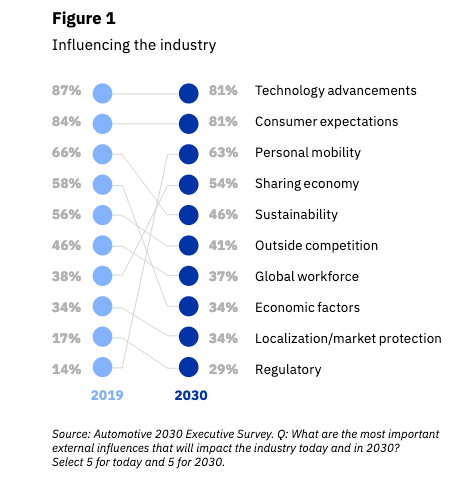Automotive 2030-Japan
Your morning commute in 2030
It’s a sunny Tuesday morning and Hana Takahashi is ready to leave for work. She is a Vehicle Digital Experience Engineer at a major Japanese automaker.
The vehicle—let’s call it “ACES” (Autonomous, Connected, Electrified, and Shared)—that she ordered Sunday night arrives and she gets in. ACES “recognizes” Hana based on her biometric information. It downloads her digital mobility profile and information to provide her with a personalized in-vehicle digital experience while she travels to work.
ACES quickly scans her health vitals and coordinates with her fitness app. It checks her house in case the TV or other appliances were left on. ACES suggests she might want to walk the last mile because she missed her exercise target last week.
Friday is Hana’s parents’ anniversary, and she still needs to get them a gift. She passes the concert hall and remembers her parents had expressed an interest in attending an upcoming event. She asks ACES’ concierge service to check with the concert hall for tickets and, if available, purchase the best two seats for Friday night. Success! ACES purchases the tickets and arranges for a vehicle to pick her parents up.
Next, Hana has ACES review her list of errands, which includes getting her laundry, having groceries delivered, picking up her children, as well as other matters she needs to attend to. It occurs to her that her team might be able to create an artificial intelligence app for ACES that could optimize the logistics of her different errands and schedule use of the appropriate vehicles for her needs.
Hana is excited about the possibilities of the app and has ACES check both her schedule and that of her agile team to set up a design-thinking workshop to explore different scenarios for the app.
As she arrives near her destination, ACES drops her off to walk the last mile. It uploads new learnings and personal preferences to her digital mobility profile and wishes her a good day. ACES then clears its memory of Hana’s information and sets out to pick up its next scheduled customer.
Does this all sound a bit far-fetched? In fact, thanks to digital technologies, these and many other vehicle capabilities and mobility services are expected to be readily available by 2030.
Many predictions about the automotive industry in 2030 support this vision:
- The sales of autonomous/AI cars is expected to be 4 million in 2040, consisting 33 percent of total vehicle sales
- The global mobility-as-a-service (MaaS) size is predicted to reach 9.9 trillion yen (USD 90 billion) by 2050
- Software will account for 90 percent of innovations in the vehicle, and lines of code will be a hundredfold what they are today
- Car-sharing could make up 26 percent of global miles..

Clearly, technology advancements and consumer expectations are the constant drivers of change over the next ten years (see Figure 1). Sustainability is driving the focus on electric cars, and the need for new skills is causing shortages in the workforce. Personal mobility serves as an even greater influence as the sharing economy grows. At the same time, the influx of outside competition delivers new value and displaces traditional automotive companies.
Regardless of how quickly the future materializes, two things are certain. First, digital technologies create entirely new ways to foster seamless touchpoints with consumers. They provide insights that deliver personalized services and integrate the vehicle with various aspects of a person’s life. And second, consumers expect the digital experiences they get from the vehicle to be as good or better than those they get from their other smart devices.
Meet the authors
Noriko Suzuki, Global Research Lead, Automotive, Electronics, and Energy Industries, IBM Institute for Business ValueHideo Yoshimura, Automotive services business lead, IBM Japan
Ben Stanley, Automotive Research Leader, IBM Institute for Business Value
Originally published 13 May 2020


